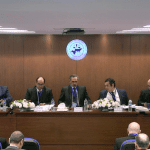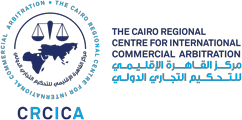
Cairo Legal Franchise Workshop and Symposium: An Accredited CFE Training Program
On 12 & 13 January 2019, CRCICA hosted and co-organized the first Legal Franchise Events in Egypt and the MENA Region: "Cairo Legal Franchise Workshop and Symposium", Cairo-Egypt. The Workshop and the Symposium were also organized by the Egyptian Franchise Development Association (EFDA) and supported by the International Franchise Association (IFA). The Symposium provided a unique opportunity for franchisors to understand all the legal aspects of franchise practices through the presentations and discussions with world top legal experts in the field. Mr. Philip Zeidman, DLA Piper Law Firm, U.S.A, who is named as the father of international franchise law and whose legacy is known to impact the franchise community for decades to come, was the keynote speaker. The Workshop was inaugurated by Dr. Hatem Zaki, Secretary General, World Franchise Council (WFC), Executive Board Member, Egyptian Franchise Development Association (EFDA) and Dr. Ismail Selim, CRCICA Director.

The agenda of the Workshop focused on the establishment of the franchise requirements and prerequisites, subsequent obligations, and the development of the franchise. The agenda of the Symposium shed light on the top legal issues in franchising from regional and international perspectives and on the digital economy’s impact on franchising. Both days were concluded by questions and answers sessions.
The Workshop and Symposium were well attended with more than 120 participants and speakers reflecting a wide spectrum of expertise and difference backgrounds including members of top franchise international institutions, law firms, State Lawsuit Authority, Supreme Constitutional Court, Public Prosecution, chambers of commerce, Ministry of Foreign Affairs, universities as well as traders and construction engineers. Attendees were from Canada, Egypt, France, Jordan, KSA, Lebanon, Libya, Nigeria, Palestine, and the USA. It is worth nothing that the participants at the event earned 400 points towards their Certification as a Franchise Executive (CFE) (made in association with ICFE-Institute of Certified Franchise Executives & IFA).

Changes to the FIDIC Forms of Contract – Red, Yellow and Silver Books: An Overview
On 25 December 2018, CRCICA organized a seminar titled “Changes to the FIDIC Forms of Contract – Red, Yellow and Silver Books: An Overview”. The speaker, Engineer Aisha Nadar of Advokatfirman Runeland, Stockholm and a FIDIC member of the Board presented the main features of the FIDIC 2017 Suite and their advantages including clarity and certainty. Ms. Nadar stressed that the new edition favored communication between the parties, which should help achieve project success by early identification of issues and the avoidance of disputes. Some of the features of the 2017 contracts presented by Eng. Nadar were: the notice as a defined term, early warning, reciprocity of obligations between the parties, more detailed claims process (Clause 20 and SC 3.7), focus on dispute avoidance, claim separated from Dispute, clause 20 (Claims), clause 21 (Disputes), and DAB renamed to DAAB (Dispute Avoidance and Adjudication Board).
The seminar was attended by about 120 participants from Egypt, Nigeria, and Saudi Arabia representing a diversity of business sectors: construction, arbitration and ADR, banking, risk management, oil and gas, real estate, telecommunication. Lawyers and members of the Egyptian judiciary and universities also attended the event.





World’s Sole Biennial International Conference on “The Role of State Courts in International Arbitration- SHARM EL SHEIKH VII”, 9-10 December 2018
CRCICA held its seventh World’s Sole Biennial International Conference on “The Role of State Courts in International Arbitration- SHARM EL SHEIKH VII” on 9-10 December 2018 at Savoy Hotel, Sharm El Sheikh, Egypt.
SHARM ELSHEIKH 2018 was the seventh of highly successful international series of conferences being held biennially since 2005 in cooperation with the United Nations Commission on International Trade Law (UNCITRAL), the International Federation of Commercial Arbitration Institutions (IFCAI) and the Arab Union for International Arbitration (AUIA).
SHARM ELSHEIKH 2018 was sponsored by 32 firms and organizations from 10 countries. Youssef & Partners have GOLD SPONSORED the Conference for first time this year. The Conference’s silver sponsors were Shahid Law Firm and Matouk Bassiouny & Hennawy. The Bronze sponsors were Shehata Attorneys at Law, Al Tamimi & Co., Aztan Law Firm, Obeid Law Firm, Ali & CO., and Fahad Elrefaei & Partners Consulting & Law Firm. Lunch was supported by Nassar Law. Supporting Organizations were a mixture of law firms, regional arbitration institutions, arbitration forums and consulting companies. Law firms and consulting companies included Mayer Brown, Rizakana & Partners, Jaber Law Firm, Mahmood Hussein Law Firm, Hassouna and Abu Ali Attorneys at Law, Karim Adel Law office, Badran Law Office, Kosheri, Rashed & Riad- Legal Consultants & Attorneys at law, BDO Legal, and Quantum Global Solutions. Arbitration institutions and legal organizations included the Bahrain Chamber for Dispute Resolution (BCDR), the Riyadh Chamber and the AEJF. The Conference was also supported by an unprecedented number of African organizations and forum: the APAA, Africa Arb, the AAA, and the East Africa International Arbitration Conference. Media partners were GAR, Law TV, Lex MEA, the I-Arb Africa, and TDM OGEMID.
2018 SHARM ELSHEIKH agenda included important topics related to the arbitration practice and relationship with state courts. The topics covered controversial issues in Egypt, the Middle East, Africa and worldwide. Latest developments related to the role of state courts in international arbitration on the Arab, African and international levels were addressed, in addition to many of the most currently debated issues including, for instance, the enforcement by state courts of the interim measures and the decisions of the emergency arbitrators, challenges facing the parties in the post-arbitral phase, and sovereign immunity against enforcement of arbitral awards according to the law and case law in France, Belgium, the United Kingdom, the United States and the OHADA. The 2018 Conference also included an important session on investment arbitration, focusing on the role of state and regional courts in investment arbitration. The Conference also witnessed the celebration of the 60th Anniversary of the New York Convention in its second day.
The conference was attended by 234 participants from 28 countries: Austria, Bahrain, Belgium, Cameroon, Canada, Chile, Egypt, France, Germany, Iraq, Italy, Jordon, Lebanon, Morocco, Nigeria, Palestine, Qatar, Rwanda, Saudi Arabia, South Africa, Spain, Sudan, Sweden, Switzerland, Syria, Tunisia, the United Arab Emirates, the United Kingdom and the United States.
Second International Arbitration Conference: “The Role of Arbitration and Mediation in Supporting Investments in Libya”, Tunis, Tunisia
On 22-23 November 2018, the Libyan Center for International Commercial Arbitration (LCICA) in cooperation with CRCICA organized the Second International Arbitration Conference in Libya titled: “The Role of Arbitration and Mediation in Supporting Investments in Libya” held at the headquarters of the Organization of Education, Science and Culture (ALECSO), Tunis, Tunisia. The conference aimed at highlighting the importance of mediation and arbitration as alternative means to resolve the international disputes to be able to support and attract foreign investments.

CRCICA Director made three presentations during the event. His first presentation was titled “The legal framework of Arbitration in Egypt,” the second was titled “Kharafi case as an example of ad-hoc arbitration and not subject to the rules of CRCICA.” During the Training Session held on the second day of the Conference, Dr. Selim delivered a speech on “How to draft and negotiate an arbitration clause.”

Mr. Remon Ramzy, Counsel, and Deputy Head of the Dispute Management Department, at CRCICA delivered a presentation on “Arbitration Costs: A Practical Perspective.”

Ms. Fatma Ibrahim, Mediation Special Advisor, CRCICA, moderated a round table on “The rising use of mediation in the settlement of commercial disputes.” Dr. Emilia Onyema, Lecturer at SOAS University of London, Member of LCICA's Advisory Board and Member of CRCICA's Advisory Committee also delivered a presentation titled “The different roles of arbitral tribunals and arbitral institutions.”
The Conference’s agenda included other important topics related to institutional arbitration, for instance, the role of the PCA as an appointing authority, the scrutiny of arbitral awards in the practice of the International Court of Arbitration at the International Chamber of Commerce (ICC) in Paris.

The Conference witnessed the signing of a cooperation agreement between CRCICA and the LCICA.
Managing Risk Through Dispute Resolution
On 18 November 2018, CRCICA co-organized and hosted a seminar on “Managing Risk Through Dispute Resolution” in cooperation with the French Chamber of Commerce and Industry in Egypt. The speakers were Mr. Rupert Reece, Partner at Gide Loyrette Nouel (London), Ms. Alexandra Munoz, Partner at Gide Loyrette Nouel (Paris) and Ms. Saadia Bhatty, Counsel, International Dispute Resolution (IDR) team at Gide Loyrette Nouel (London). CRCICA’s Director moderated the seminar. The speakers discussed important issues including: state courts and arbitration, managing risk through investment arbitration, sources and specificities of investment arbitration, good practices for host states, advantages and limitations of ADR mechanisms and escalation clauses.











The seminar was attended by about 120 participants from Denmark, Egypt, and Japan, representing the Egyptian State Lawsuit Authority, ministries, universities, judicial and public entities, in addition to professionals from various business sectors including construction & engineering, electricity, banking, media and technology.

